Role of Stakeholders and External Bodies in Education and Training
VerifiedAdded on 2023/01/03
|11
|1383
|1
Presentation
AI Summary
This presentation discusses the role of stakeholders and external bodies in education and training programs. It explores the importance of being accountable to stakeholders and the impact it has on organizations. The benefits of working in partnership with employers and other stakeholders are also discussed. The presentation analyzes the impact of accountability on curriculum design, delivery, and assessment. It also evaluates the quality improvement and quality assurance arrangements of your organization. The function of self-assessment and self-evaluation in the quality cycle is explained, and a learning program is evaluated to identify areas for improvement.
Contribute Materials
Your contribution can guide someone’s learning journey. Share your
documents today.
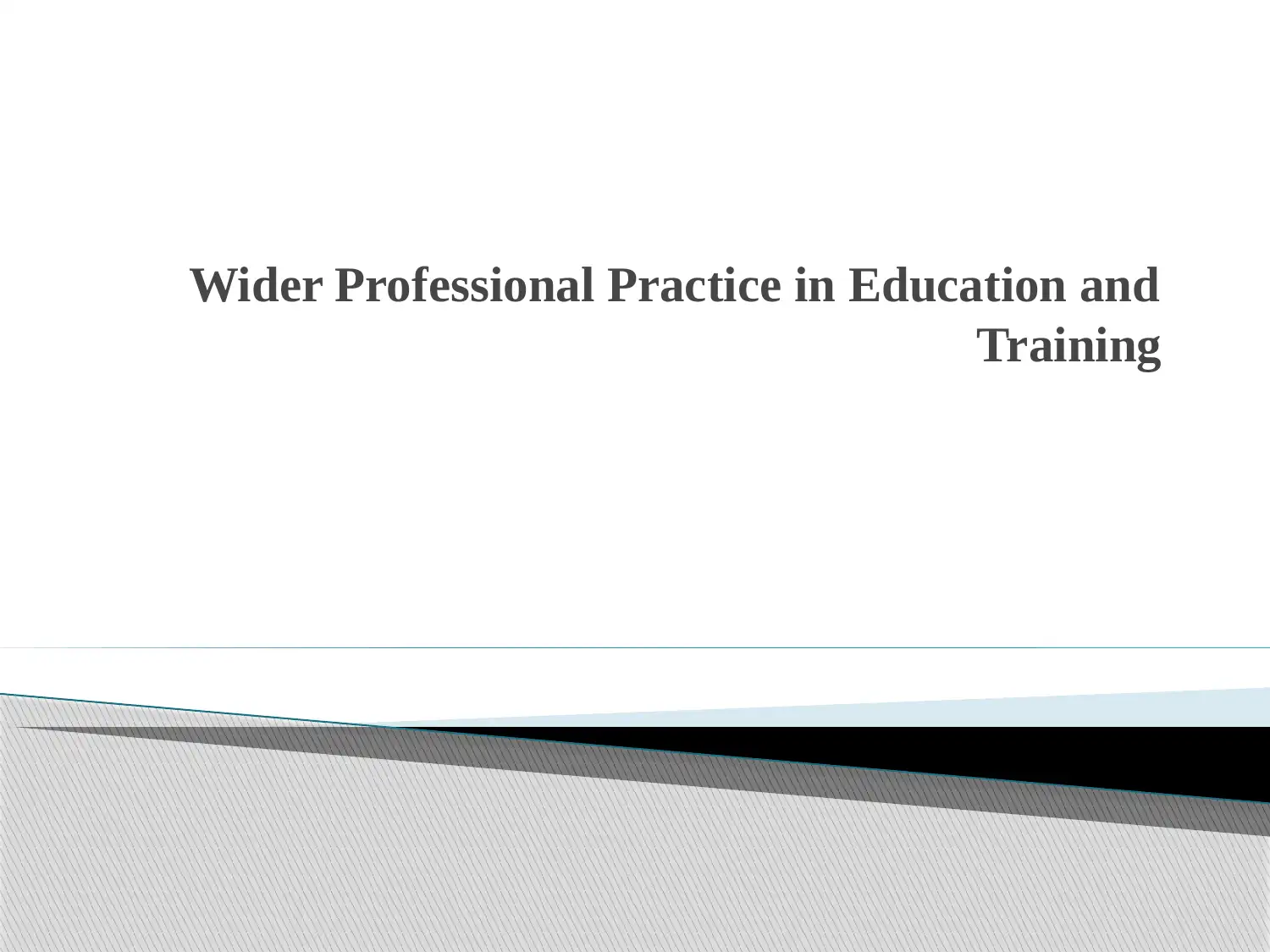
Wider Professional Practice in Education and
Training
Training
Secure Best Marks with AI Grader
Need help grading? Try our AI Grader for instant feedback on your assignments.
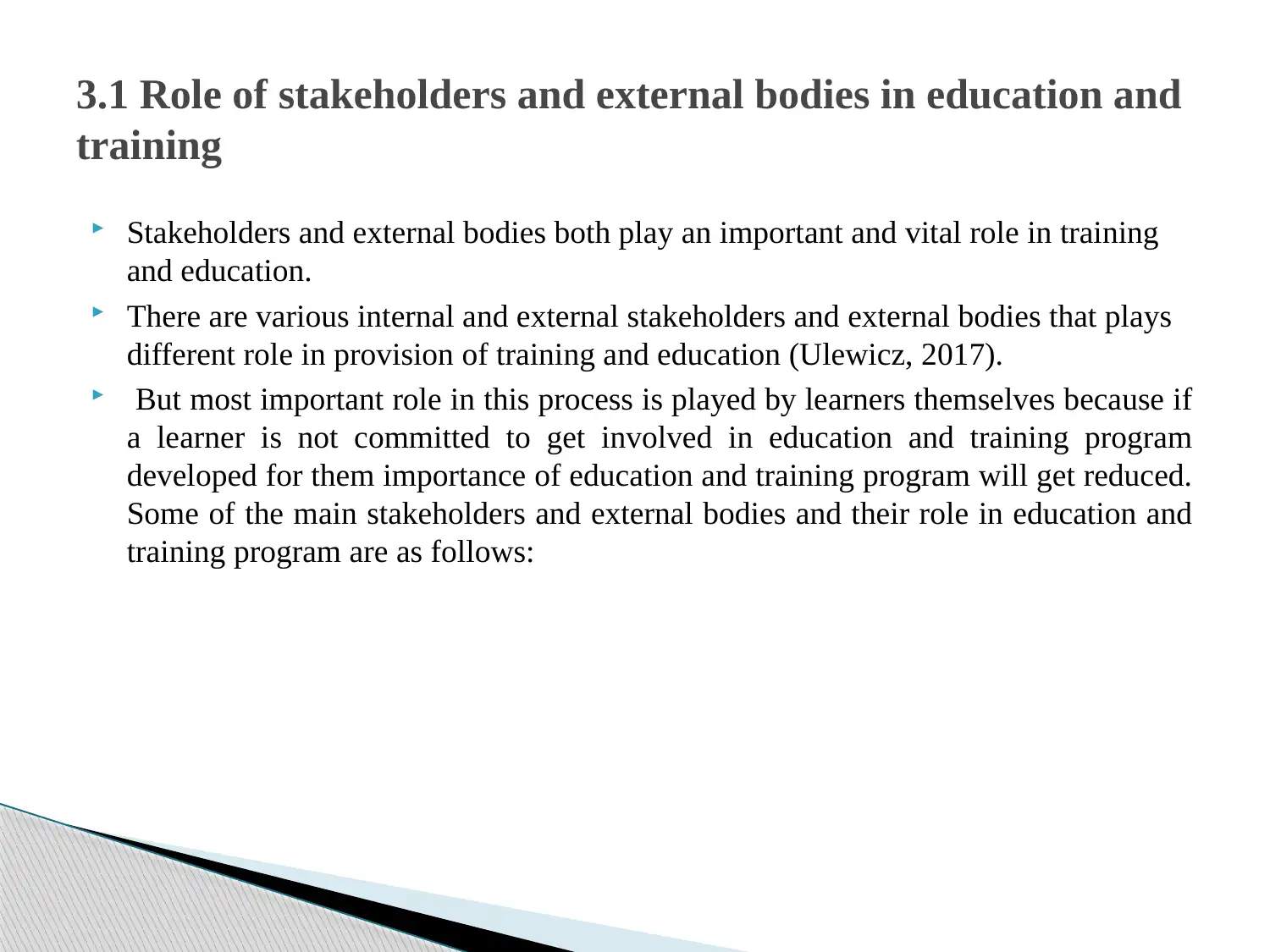
Stakeholders and external bodies both play an important and vital role in training
and education.
There are various internal and external stakeholders and external bodies that plays
different role in provision of training and education (Ulewicz, 2017).
But most important role in this process is played by learners themselves because if
a learner is not committed to get involved in education and training program
developed for them importance of education and training program will get reduced.
Some of the main stakeholders and external bodies and their role in education and
training program are as follows:
3.1 Role of stakeholders and external bodies in education and
training
and education.
There are various internal and external stakeholders and external bodies that plays
different role in provision of training and education (Ulewicz, 2017).
But most important role in this process is played by learners themselves because if
a learner is not committed to get involved in education and training program
developed for them importance of education and training program will get reduced.
Some of the main stakeholders and external bodies and their role in education and
training program are as follows:
3.1 Role of stakeholders and external bodies in education and
training
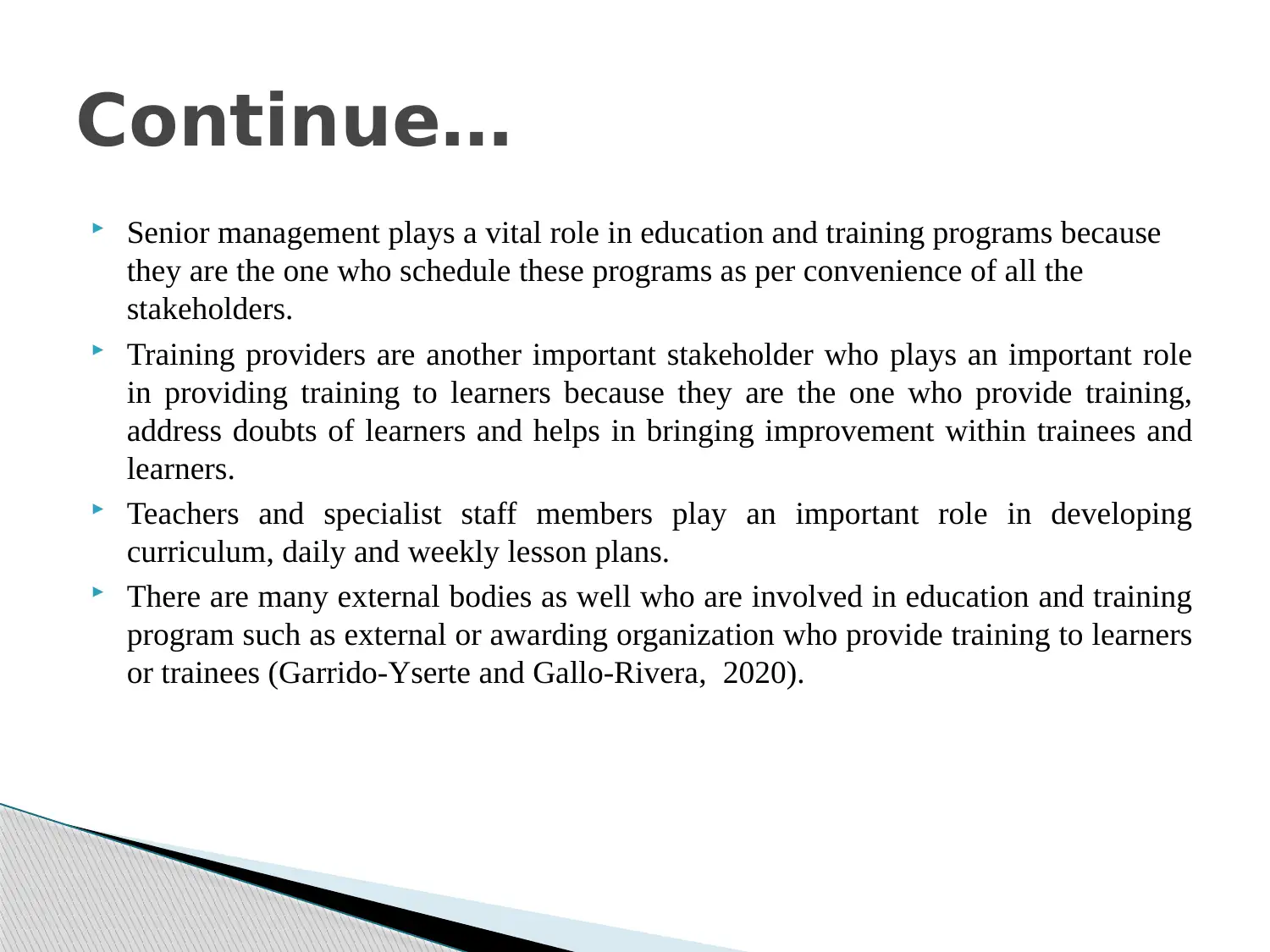
Senior management plays a vital role in education and training programs because
they are the one who schedule these programs as per convenience of all the
stakeholders.
Training providers are another important stakeholder who plays an important role
in providing training to learners because they are the one who provide training,
address doubts of learners and helps in bringing improvement within trainees and
learners.
Teachers and specialist staff members play an important role in developing
curriculum, daily and weekly lesson plans.
There are many external bodies as well who are involved in education and training
program such as external or awarding organization who provide training to learners
or trainees (Garrido-Yserte and Gallo-Rivera, 2020).
Continue…
they are the one who schedule these programs as per convenience of all the
stakeholders.
Training providers are another important stakeholder who plays an important role
in providing training to learners because they are the one who provide training,
address doubts of learners and helps in bringing improvement within trainees and
learners.
Teachers and specialist staff members play an important role in developing
curriculum, daily and weekly lesson plans.
There are many external bodies as well who are involved in education and training
program such as external or awarding organization who provide training to learners
or trainees (Garrido-Yserte and Gallo-Rivera, 2020).
Continue…
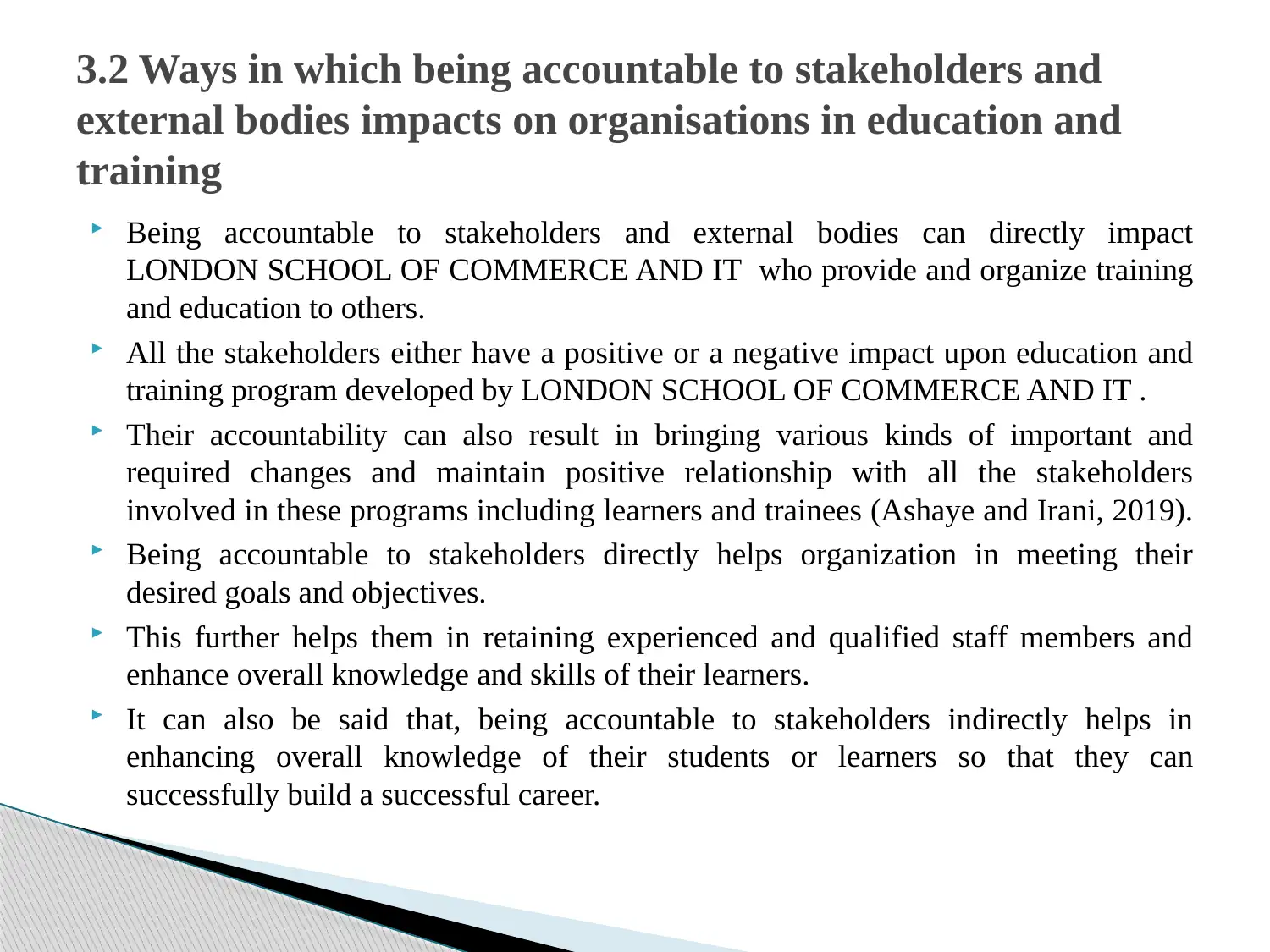
Being accountable to stakeholders and external bodies can directly impact
LONDON SCHOOL OF COMMERCE AND IT who provide and organize training
and education to others.
All the stakeholders either have a positive or a negative impact upon education and
training program developed by LONDON SCHOOL OF COMMERCE AND IT .
Their accountability can also result in bringing various kinds of important and
required changes and maintain positive relationship with all the stakeholders
involved in these programs including learners and trainees (Ashaye and Irani, 2019).
Being accountable to stakeholders directly helps organization in meeting their
desired goals and objectives.
This further helps them in retaining experienced and qualified staff members and
enhance overall knowledge and skills of their learners.
It can also be said that, being accountable to stakeholders indirectly helps in
enhancing overall knowledge of their students or learners so that they can
successfully build a successful career.
3.2 Ways in which being accountable to stakeholders and
external bodies impacts on organisations in education and
training
LONDON SCHOOL OF COMMERCE AND IT who provide and organize training
and education to others.
All the stakeholders either have a positive or a negative impact upon education and
training program developed by LONDON SCHOOL OF COMMERCE AND IT .
Their accountability can also result in bringing various kinds of important and
required changes and maintain positive relationship with all the stakeholders
involved in these programs including learners and trainees (Ashaye and Irani, 2019).
Being accountable to stakeholders directly helps organization in meeting their
desired goals and objectives.
This further helps them in retaining experienced and qualified staff members and
enhance overall knowledge and skills of their learners.
It can also be said that, being accountable to stakeholders indirectly helps in
enhancing overall knowledge of their students or learners so that they can
successfully build a successful career.
3.2 Ways in which being accountable to stakeholders and
external bodies impacts on organisations in education and
training
Secure Best Marks with AI Grader
Need help grading? Try our AI Grader for instant feedback on your assignments.
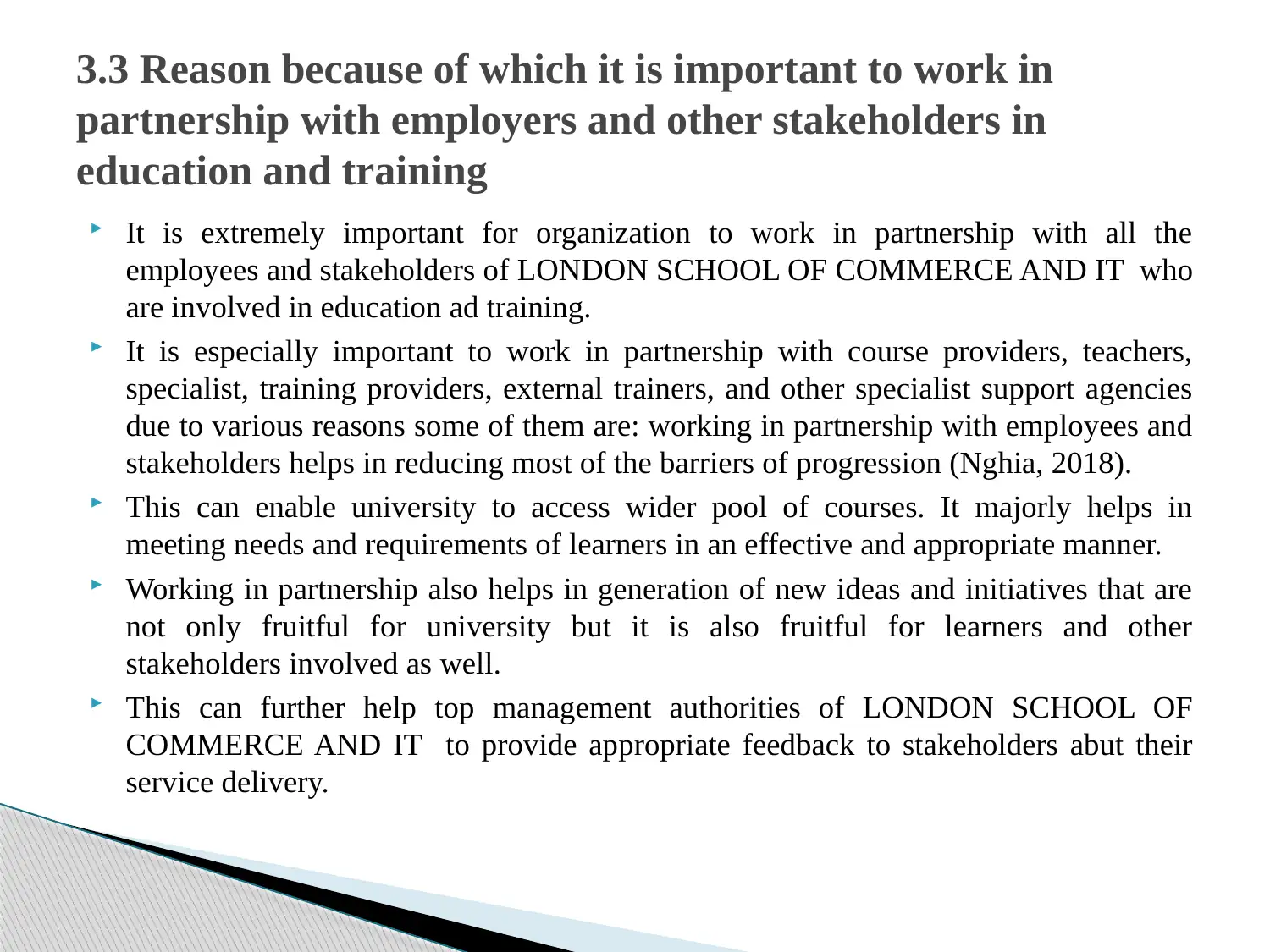
It is extremely important for organization to work in partnership with all the
employees and stakeholders of LONDON SCHOOL OF COMMERCE AND IT who
are involved in education ad training.
It is especially important to work in partnership with course providers, teachers,
specialist, training providers, external trainers, and other specialist support agencies
due to various reasons some of them are: working in partnership with employees and
stakeholders helps in reducing most of the barriers of progression (Nghia, 2018).
This can enable university to access wider pool of courses. It majorly helps in
meeting needs and requirements of learners in an effective and appropriate manner.
Working in partnership also helps in generation of new ideas and initiatives that are
not only fruitful for university but it is also fruitful for learners and other
stakeholders involved as well.
This can further help top management authorities of LONDON SCHOOL OF
COMMERCE AND IT to provide appropriate feedback to stakeholders abut their
service delivery.
3.3 Reason because of which it is important to work in
partnership with employers and other stakeholders in
education and training
employees and stakeholders of LONDON SCHOOL OF COMMERCE AND IT who
are involved in education ad training.
It is especially important to work in partnership with course providers, teachers,
specialist, training providers, external trainers, and other specialist support agencies
due to various reasons some of them are: working in partnership with employees and
stakeholders helps in reducing most of the barriers of progression (Nghia, 2018).
This can enable university to access wider pool of courses. It majorly helps in
meeting needs and requirements of learners in an effective and appropriate manner.
Working in partnership also helps in generation of new ideas and initiatives that are
not only fruitful for university but it is also fruitful for learners and other
stakeholders involved as well.
This can further help top management authorities of LONDON SCHOOL OF
COMMERCE AND IT to provide appropriate feedback to stakeholders abut their
service delivery.
3.3 Reason because of which it is important to work in
partnership with employers and other stakeholders in
education and training
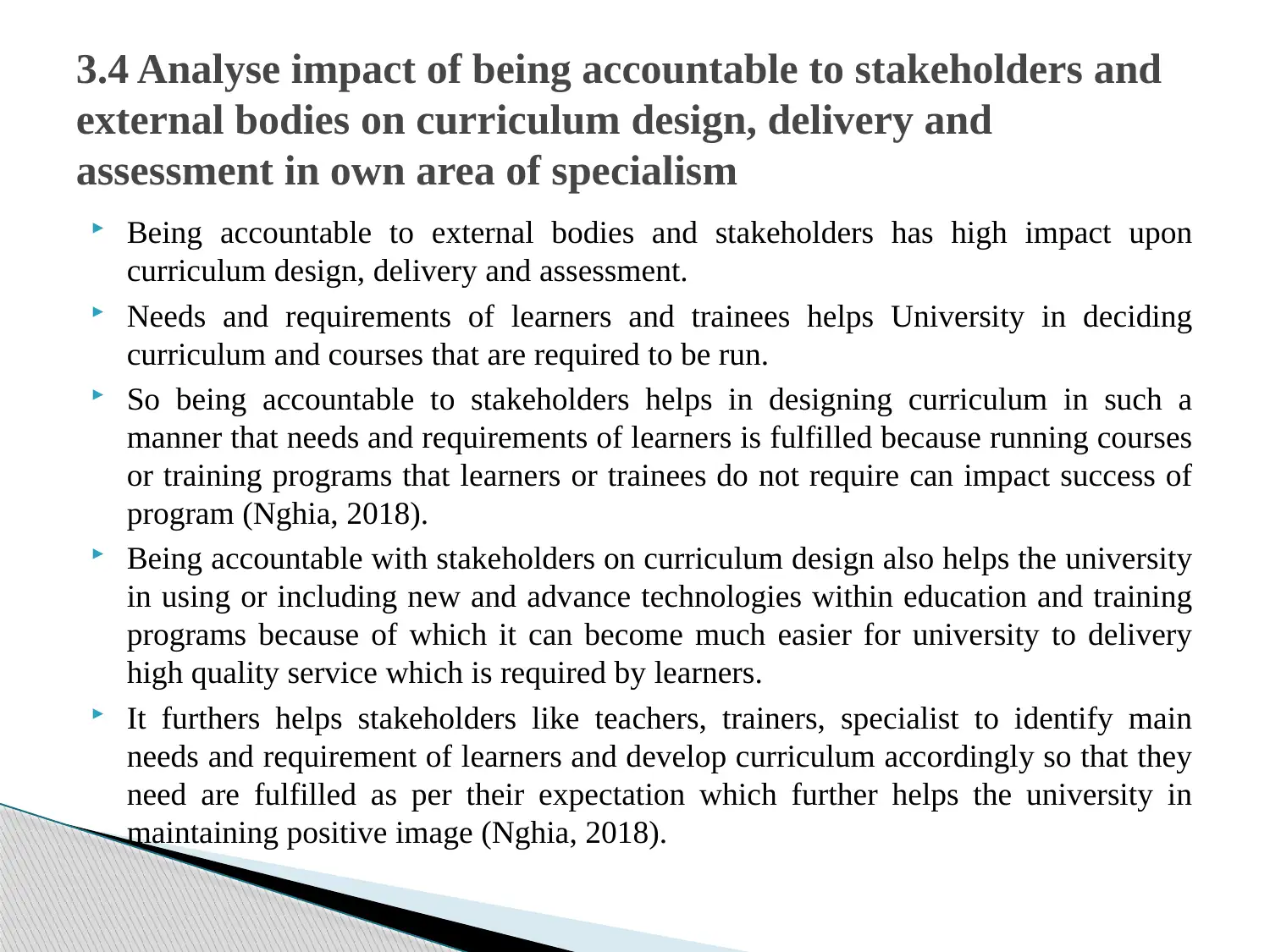
Being accountable to external bodies and stakeholders has high impact upon
curriculum design, delivery and assessment.
Needs and requirements of learners and trainees helps University in deciding
curriculum and courses that are required to be run.
So being accountable to stakeholders helps in designing curriculum in such a
manner that needs and requirements of learners is fulfilled because running courses
or training programs that learners or trainees do not require can impact success of
program (Nghia, 2018).
Being accountable with stakeholders on curriculum design also helps the university
in using or including new and advance technologies within education and training
programs because of which it can become much easier for university to delivery
high quality service which is required by learners.
It furthers helps stakeholders like teachers, trainers, specialist to identify main
needs and requirement of learners and develop curriculum accordingly so that they
need are fulfilled as per their expectation which further helps the university in
maintaining positive image (Nghia, 2018).
3.4 Analyse impact of being accountable to stakeholders and
external bodies on curriculum design, delivery and
assessment in own area of specialism
curriculum design, delivery and assessment.
Needs and requirements of learners and trainees helps University in deciding
curriculum and courses that are required to be run.
So being accountable to stakeholders helps in designing curriculum in such a
manner that needs and requirements of learners is fulfilled because running courses
or training programs that learners or trainees do not require can impact success of
program (Nghia, 2018).
Being accountable with stakeholders on curriculum design also helps the university
in using or including new and advance technologies within education and training
programs because of which it can become much easier for university to delivery
high quality service which is required by learners.
It furthers helps stakeholders like teachers, trainers, specialist to identify main
needs and requirement of learners and develop curriculum accordingly so that they
need are fulfilled as per their expectation which further helps the university in
maintaining positive image (Nghia, 2018).
3.4 Analyse impact of being accountable to stakeholders and
external bodies on curriculum design, delivery and
assessment in own area of specialism
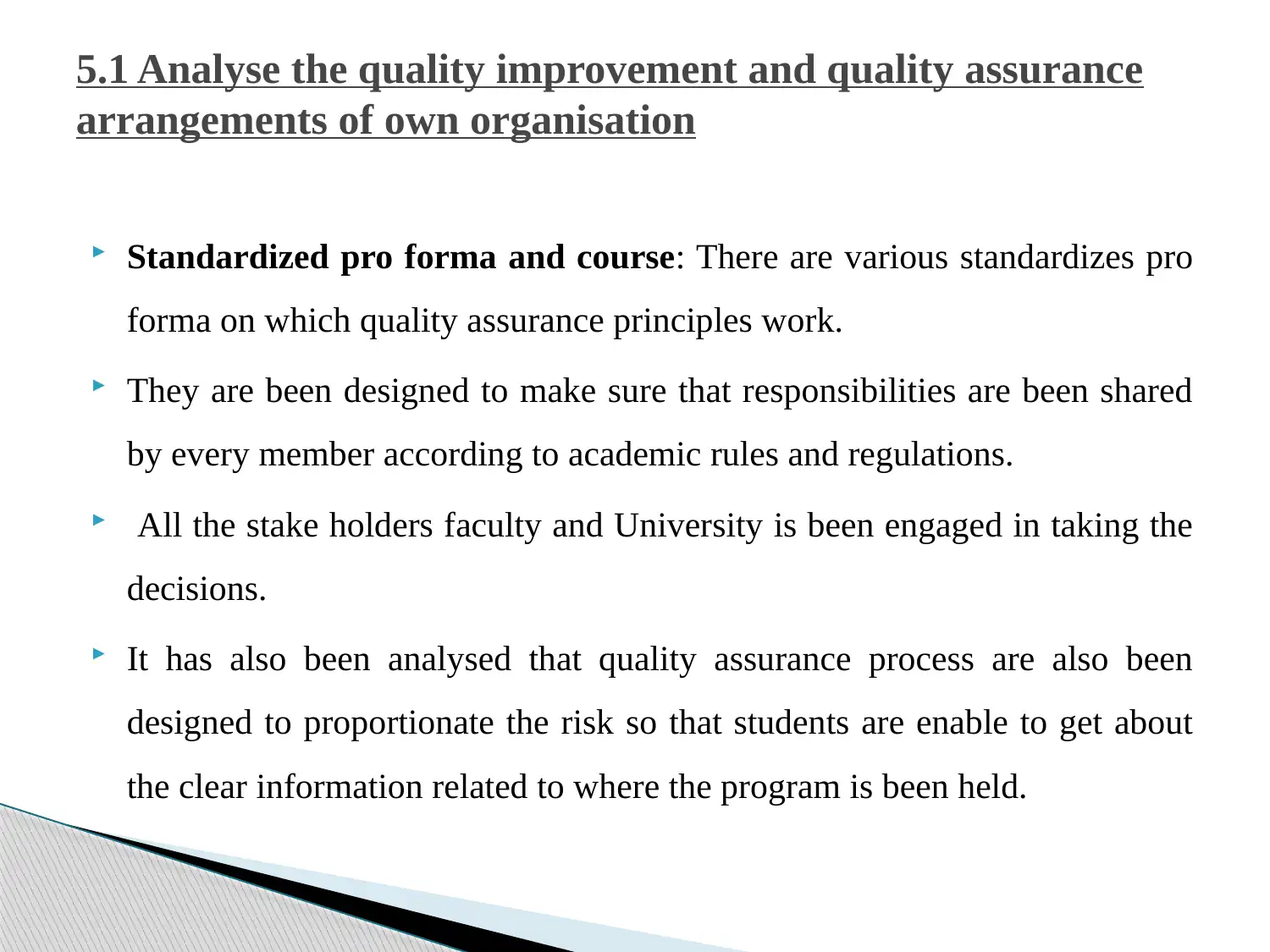
Standardized pro forma and course: There are various standardizes pro
forma on which quality assurance principles work.
They are been designed to make sure that responsibilities are been shared
by every member according to academic rules and regulations.
All the stake holders faculty and University is been engaged in taking the
decisions.
It has also been analysed that quality assurance process are also been
designed to proportionate the risk so that students are enable to get about
the clear information related to where the program is been held.
5.1 Analyse the quality improvement and quality assurance
arrangements of own organisation
forma on which quality assurance principles work.
They are been designed to make sure that responsibilities are been shared
by every member according to academic rules and regulations.
All the stake holders faculty and University is been engaged in taking the
decisions.
It has also been analysed that quality assurance process are also been
designed to proportionate the risk so that students are enable to get about
the clear information related to where the program is been held.
5.1 Analyse the quality improvement and quality assurance
arrangements of own organisation
Paraphrase This Document
Need a fresh take? Get an instant paraphrase of this document with our AI Paraphraser
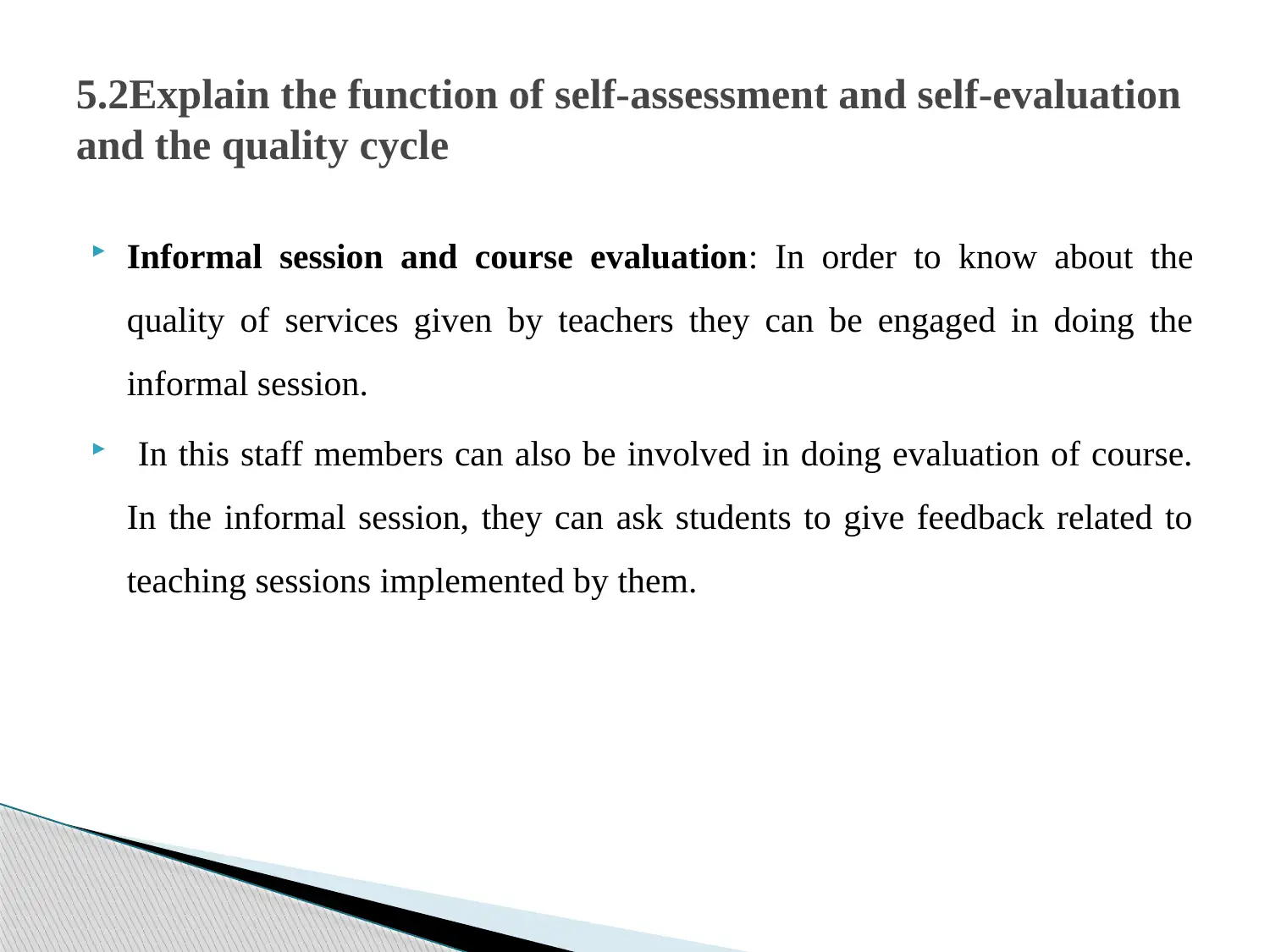
Informal session and course evaluation: In order to know about the
quality of services given by teachers they can be engaged in doing the
informal session.
In this staff members can also be involved in doing evaluation of course.
In the informal session, they can ask students to give feedback related to
teaching sessions implemented by them.
5.2Explain the function of self-assessment and self-evaluation
and the quality cycle
quality of services given by teachers they can be engaged in doing the
informal session.
In this staff members can also be involved in doing evaluation of course.
In the informal session, they can ask students to give feedback related to
teaching sessions implemented by them.
5.2Explain the function of self-assessment and self-evaluation
and the quality cycle
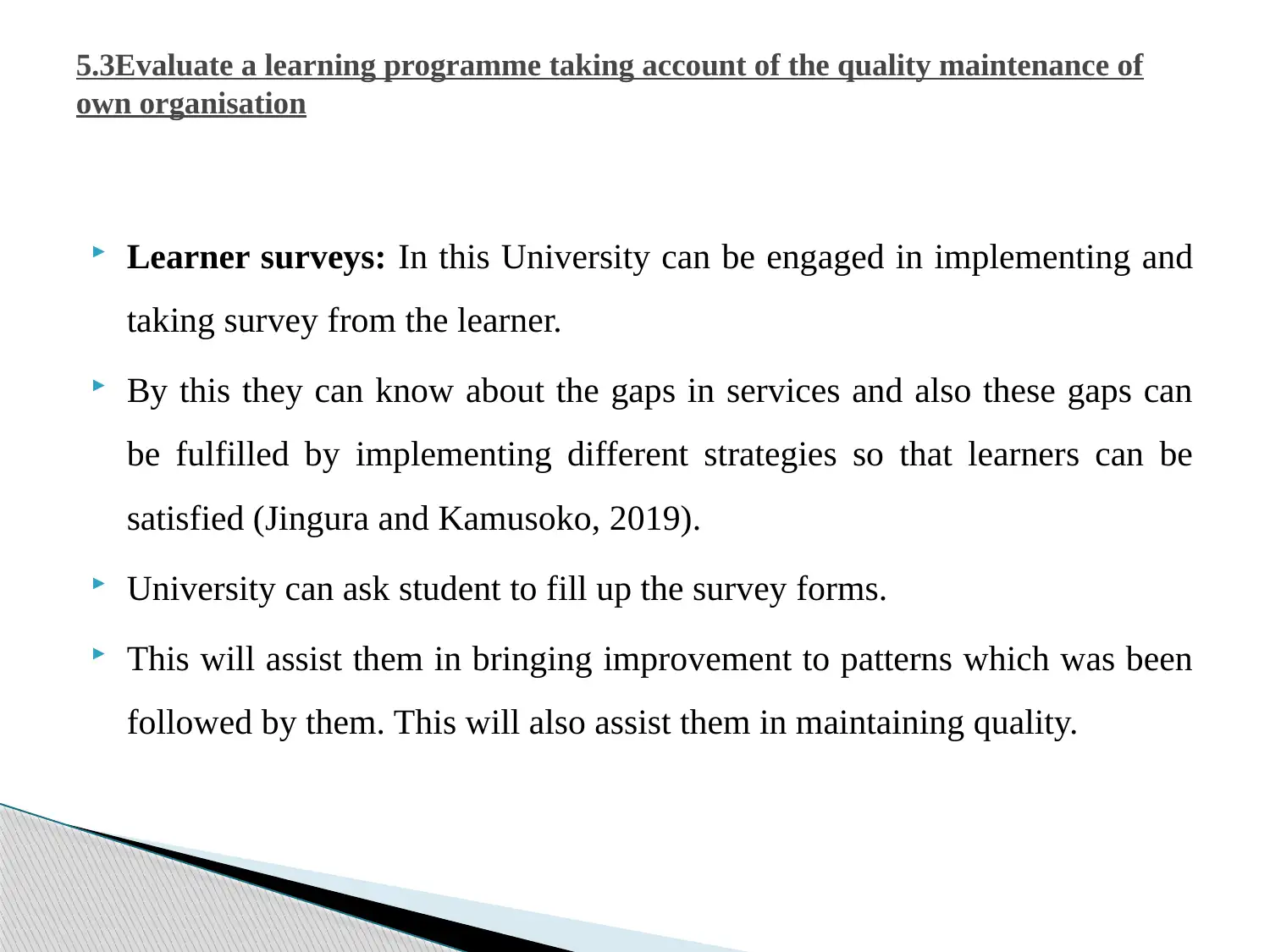
Learner surveys: In this University can be engaged in implementing and
taking survey from the learner.
By this they can know about the gaps in services and also these gaps can
be fulfilled by implementing different strategies so that learners can be
satisfied (Jingura and Kamusoko, 2019).
University can ask student to fill up the survey forms.
This will assist them in bringing improvement to patterns which was been
followed by them. This will also assist them in maintaining quality.
5.3Evaluate a learning programme taking account of the quality maintenance of
own organisation
taking survey from the learner.
By this they can know about the gaps in services and also these gaps can
be fulfilled by implementing different strategies so that learners can be
satisfied (Jingura and Kamusoko, 2019).
University can ask student to fill up the survey forms.
This will assist them in bringing improvement to patterns which was been
followed by them. This will also assist them in maintaining quality.
5.3Evaluate a learning programme taking account of the quality maintenance of
own organisation
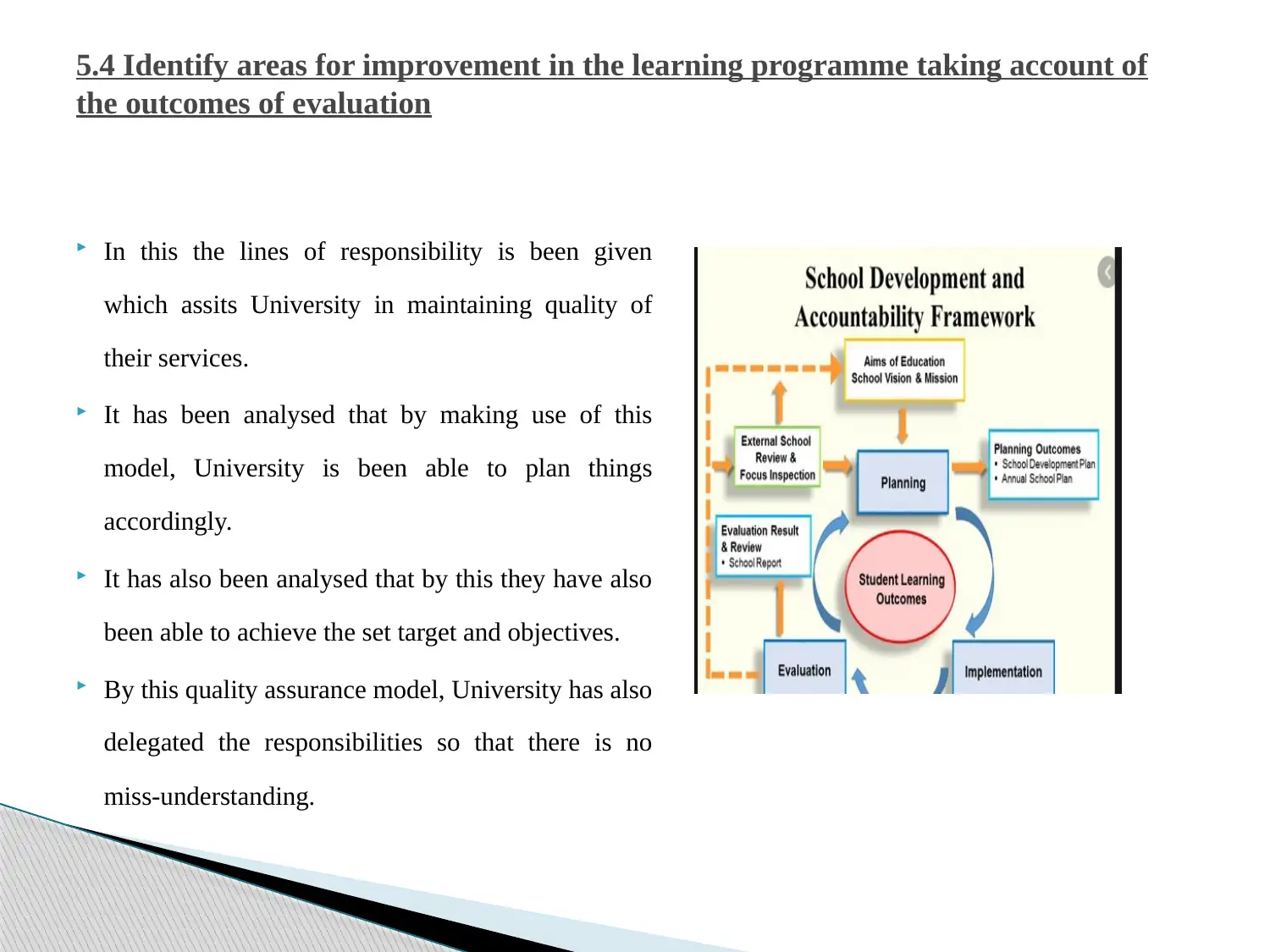
In this the lines of responsibility is been given
which assits University in maintaining quality of
their services.
It has been analysed that by making use of this
model, University is been able to plan things
accordingly.
It has also been analysed that by this they have also
been able to achieve the set target and objectives.
By this quality assurance model, University has also
delegated the responsibilities so that there is no
miss-understanding.
5.4 Identify areas for improvement in the learning programme taking account of
the outcomes of evaluation
which assits University in maintaining quality of
their services.
It has been analysed that by making use of this
model, University is been able to plan things
accordingly.
It has also been analysed that by this they have also
been able to achieve the set target and objectives.
By this quality assurance model, University has also
delegated the responsibilities so that there is no
miss-understanding.
5.4 Identify areas for improvement in the learning programme taking account of
the outcomes of evaluation
Secure Best Marks with AI Grader
Need help grading? Try our AI Grader for instant feedback on your assignments.
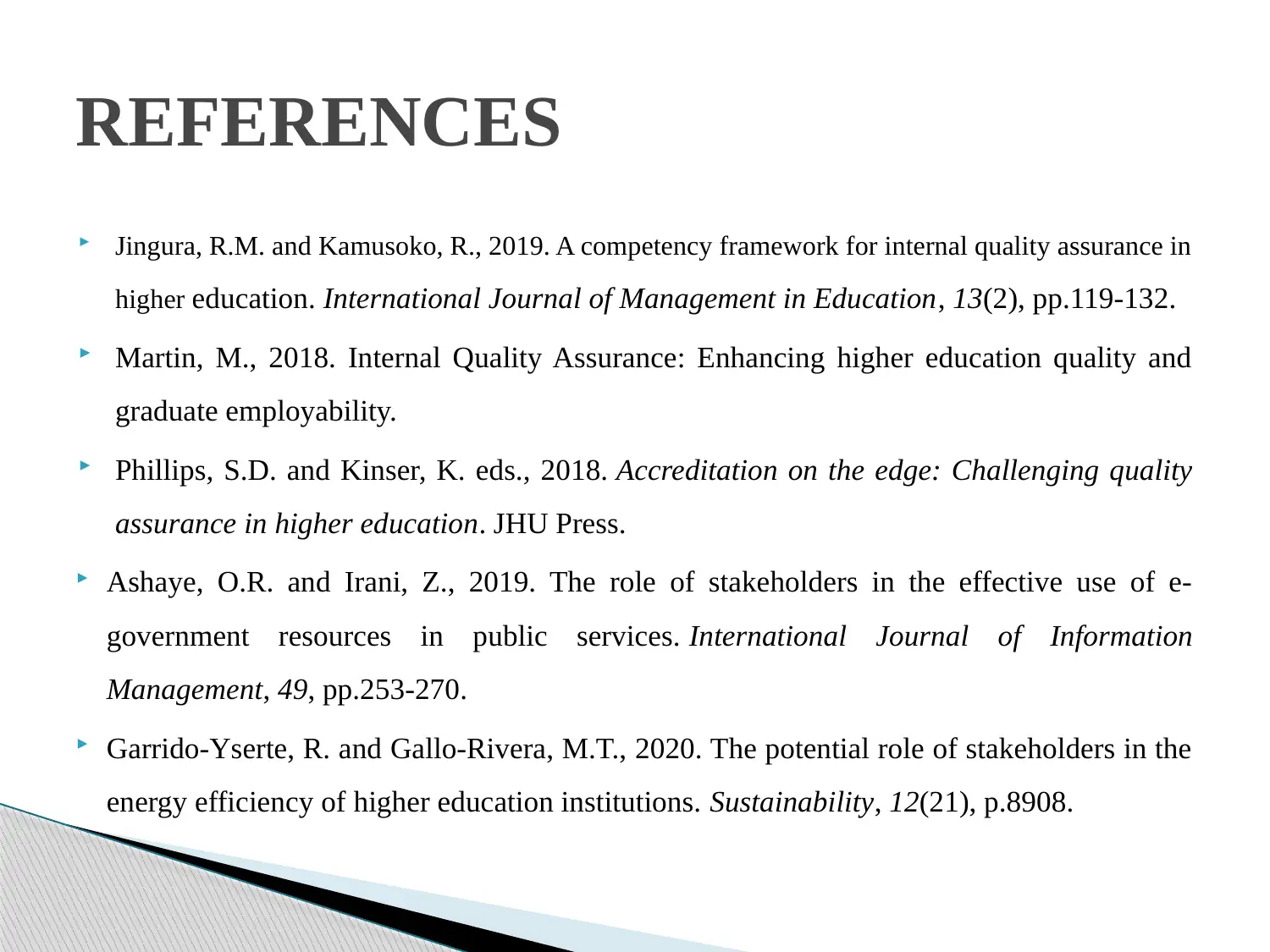
Jingura, R.M. and Kamusoko, R., 2019. A competency framework for internal quality assurance in
higher education. International Journal of Management in Education, 13(2), pp.119-132.
Martin, M., 2018. Internal Quality Assurance: Enhancing higher education quality and
graduate employability.
Phillips, S.D. and Kinser, K. eds., 2018. Accreditation on the edge: Challenging quality
assurance in higher education. JHU Press.
Ashaye, O.R. and Irani, Z., 2019. The role of stakeholders in the effective use of e-
government resources in public services. International Journal of Information
Management, 49, pp.253-270.
Garrido-Yserte, R. and Gallo-Rivera, M.T., 2020. The potential role of stakeholders in the
energy efficiency of higher education institutions. Sustainability, 12(21), p.8908.
REFERENCES
higher education. International Journal of Management in Education, 13(2), pp.119-132.
Martin, M., 2018. Internal Quality Assurance: Enhancing higher education quality and
graduate employability.
Phillips, S.D. and Kinser, K. eds., 2018. Accreditation on the edge: Challenging quality
assurance in higher education. JHU Press.
Ashaye, O.R. and Irani, Z., 2019. The role of stakeholders in the effective use of e-
government resources in public services. International Journal of Information
Management, 49, pp.253-270.
Garrido-Yserte, R. and Gallo-Rivera, M.T., 2020. The potential role of stakeholders in the
energy efficiency of higher education institutions. Sustainability, 12(21), p.8908.
REFERENCES
1 out of 11
Related Documents
Your All-in-One AI-Powered Toolkit for Academic Success.
+13062052269
info@desklib.com
Available 24*7 on WhatsApp / Email
![[object Object]](/_next/static/media/star-bottom.7253800d.svg)
Unlock your academic potential
© 2024 | Zucol Services PVT LTD | All rights reserved.




